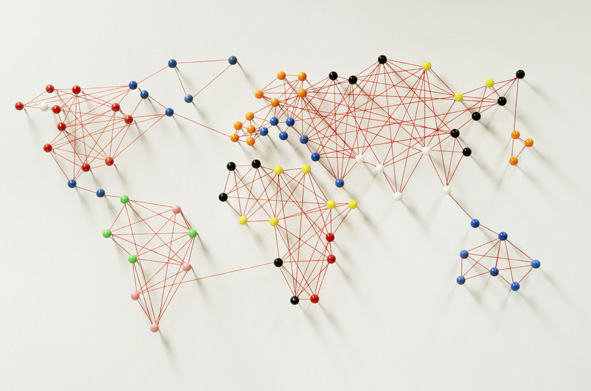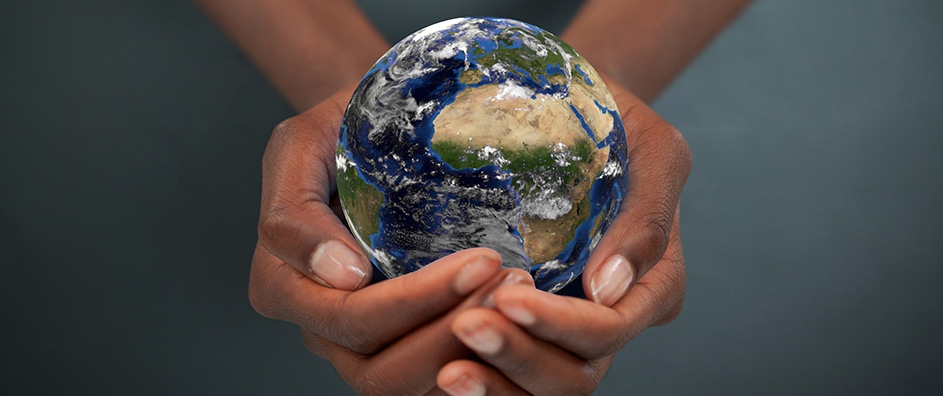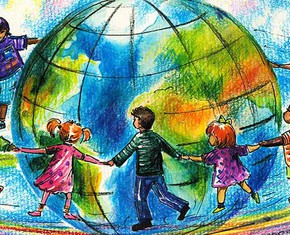The views expressed in our content reflect individual perspectives and do not represent the authoritative views of the Baha'i Faith.
The most glorious fruit of the tree of knowledge is this exalted word: Of one tree are all ye the fruit, and of one bough the leaves. Let not man glory in this that he loveth his country, let him rather glory in this that he loveth his kind. – Baha’u’llah, Tablets of Baha’u’llah, pp. 127-128.
No previous period in human history has ever witnessed such massive global change. I know, it’s a cliché, but that doesn’t make it any less true.
In barely more than a century, the historical blink of an eye, human civilization has undergone swift, dizzying and even incomprehensible alteration.
Human life actually didn’t change very drastically or very quickly until about a hundred and fifty years ago. In the early 1800s, most people lived pretty much the same way they did for the past couple of millennia. Mechanical progress relied on rudimentary tools and metallurgy; science had just begun to attempt to understand the natural world comprehensively; contemporary medicine still languished in its infancy; the great preponderance of the world’s people worked in agriculture and had no formal education; and modern transportation, communication and information technology never even occurred in the best and brightest’s wildest dreams.
A little more than a hundred years ago, it took my grandfather Olaf four grueling and difficult months to travel from his ancestral home in Norway to his emigrant’s destination of North Dakota. He walked, rode mules and horses, took a steam train, crossed the North Sea and the Atlantic by sailing ship and then traveled by narrow gauge railroad and covered wagon across the American prairie.
When I went to Norway a few years ago it took me sixteen hours.
And yet, despite this enormous pace of progress in globalization, we still cling to some very antiquated ideas, institutions and structures. Maybe most perplexingly, humanity continues to hang on to the old 18th-Century construct of the nation-state.
 Modern nation-states, defined as a sovereign government with physical borders, emerged in the late 1700s with the revolutions in France and America. Many historians argue that nations existed earlier—the Dutch, the British, the German, even the ancient Egyptian—but those early nations looked more like empires, loose confederations of various kingdoms and fiefdoms, all with shifting rather than fixed borders. With the rise of the modern nation-state and its defined and rigidly-defended territories, we also saw the rise of national antagonisms and battles, which led us to the most destructive military conflicts in human history, the two World Wars in the first half of the 20th Century.
Modern nation-states, defined as a sovereign government with physical borders, emerged in the late 1700s with the revolutions in France and America. Many historians argue that nations existed earlier—the Dutch, the British, the German, even the ancient Egyptian—but those early nations looked more like empires, loose confederations of various kingdoms and fiefdoms, all with shifting rather than fixed borders. With the rise of the modern nation-state and its defined and rigidly-defended territories, we also saw the rise of national antagonisms and battles, which led us to the most destructive military conflicts in human history, the two World Wars in the first half of the 20th Century.
As a way to unify and provide an identity for people, the nation-state worked well for a few hundred years. It supplanted tribalism and city-states and kingdoms as the world contracted, as distances shrunk, as technology advanced.
But today, antiquated, artificial and dysfunctional, inherently conflictive and warlike, the nation-state has outlived its usefulness. In a world where international communication, travel, commerce, trade and interchange happen across national borders every millisecond; in a world where the ebb and flow of immigration never ceases; in a world where human abilities, mobility and longevity have extended themselves to previously-unheard-of levels; and in a world where freedom of expression and movement have become commonplace for the majority of the planet’s population; the outmoded conceptual framework of the nation-state can only offer humanity a set of obsolete restrictions and barriers to its continuing growth and development.
Instead, Baha’is believe the time has come for a unified world:
This is one globe, one land, one country. God did not divide it into national boundaries. He created all the continents without national divisions. Why should we make such division ourselves? These are but imaginary lines and boundaries. Europe is a continent; it is not naturally divided; man has drawn the lines and established the limits of kingdoms and empires. Man declares a river to be a boundary line between two countries, calling this side French and the other side German, whereas the river was created for both and is a natural artery for all. Is it not imagination and ignorance which impels man to violate the divine intention and make the very bounties of God the cause of war, bloodshed and destruction? Therefore, all prejudices between man and man are falsehoods and violations of the will of God. God desires unity and love; He commands harmony and fellowship. Enmity is human disobedience; God Himself is love. – Abdu’l-Baha, The Promulgation of Universal Peace, pp. 299-300.
















Comments
Sign in or create an account
Continue with Googleor